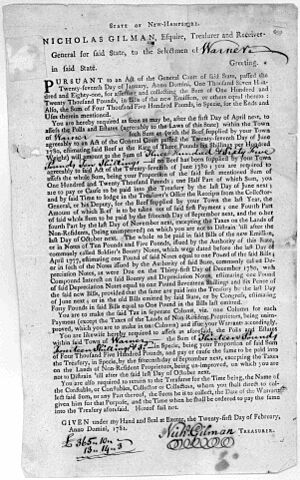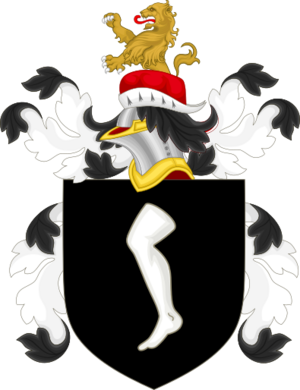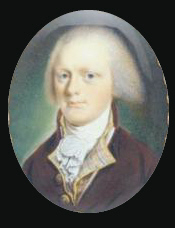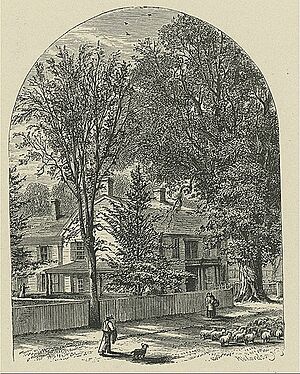Nicholas Gilman facts for kids
Quick facts for kids
Nicholas Gilman Jr.
|
|
|---|---|
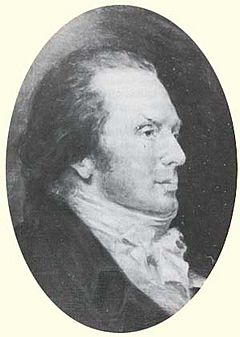 |
|
| United States Senator from New Hampshire |
|
| In office March 4, 1805 – May 2, 1814 |
|
| Preceded by | Simeon Olcott |
| Succeeded by | Thomas W. Thompson |
| Member of the U.S. House of Representatives from New Hampshire's At-large district | |
| In office March 4, 1789 – March 3, 1797 |
|
| Preceded by | District created |
| Succeeded by | Jonathan Freeman |
| Personal details | |
| Born | August 3, 1755 Exeter, Province of New Hampshire, British America |
| Died | May 2, 1814 (aged 58) Philadelphia, Pennsylvania, U.S. |
| Resting place | Exeter Cemetery, Exeter |
| Political party | Democratic-Republican |
| Residence | Exeter, New Hampshire |
| Occupation | merchant, state treasurer, U.S. Representative At-large |
| Signature | |
Nicholas Gilman Jr. (born August 3, 1755 – died May 2, 1814) was an important person in early American history. He is known as one of the Founding Fathers. He fought as a soldier in the Continental Army during the American Revolutionary War.
Gilman was also a delegate to the Continental Congress. He signed the U.S. Constitution for New Hampshire. Later, he served in the United States House of Representatives and the United States Senate. His brother, John Taylor Gilman, was also a key figure in New Hampshire politics. Their childhood home in Exeter is now the American Independence Museum.
Early Life and Family
Nicholas Gilman Jr. was born in Exeter, Province of New Hampshire. His parents were Ann (Taylor) and Nicholas Gilman. He was the second of six children. He had four brothers and one sister.
Nicholas grew up during the French and Indian War. This made him aware of military duties. After school, he worked as a clerk in his father's trading business. But soon, the colonies and Great Britain began to disagree.
Many American colonists felt their rights were being ignored. Nicholas's father became a leader for the Patriot cause in Exeter. He helped create the state constitution. During the American Revolution, Nicholas's father served as the state's treasurer. Nicholas supported the Patriots and likely trained with the local militia.
Fighting in the Revolutionary War
In November 1776, Nicholas Gilman became an adjutant. This is an administrative officer. He joined the 3rd New Hampshire Regiment. His commander, Colonel Alexander Scammell, was a great officer. Scammell used Gilman's skills to train new soldiers. The 3rd New Hampshire Regiment became a strong part of General George Washington's Continental Army.
New Hampshire was on the main invasion route from Canada to New York. So, its regiments were important for defending the northern states. In 1777, Gilman's regiment marched to Fort Ticonderoga. They tried to stop a large British and German army. The British outsmarted the fort, and the American soldiers had to escape.
The American army retreated through the summer. But British travel problems and American delays slowed them down. This gave New England militias time to gather. Gilman's father even led a group of volunteers. Major General Horatio Gates set up new positions near Saratoga, New York. This blocked the British army.
Gilman helped train Scammell's soldiers during this time. He fought in two important battles at Freeman's Farm. The British army was badly beaten there. Eventually, General Burgoyne had to surrender his entire army.
After this big victory, Gilman's regiment went to reinforce Washington's main army near Philadelphia. They spent a very harsh winter at Valley Forge. This was a time of great suffering for the soldiers. But they became a strong, professional fighting force. Gilman's administrative skills were very helpful. When Washington chose Colonel Scammell as the army's Adjutant General, Scammell made Gilman his assistant. Gilman became a captain in June 1778.
For the rest of the war, Gilman worked closely with top military leaders. He helped with many tasks to keep the army going. He worked with Washington, Baron von Steuben, Henry Knox, and Nathanael Greene. He fought in battles like Monmouth and Yorktown. Sadly, Colonel Scammell died before the victory at Yorktown. After his father died in 1783, Gilman left the army. He returned to Exeter to take over his family's business.
A Career in Politics
After the war, Nicholas Gilman became a statesman. His time as an army officer taught him about the need for a strong national government. In 1786, New Hampshire chose Gilman to be part of the Continental Congress. He was also chosen for the Annapolis Convention. This meeting was called to fix the country's economic problems.
In late 1786, there was unrest in western Massachusetts. This made Gilman even more sure that the Articles of Confederation needed to change. He helped stop the Paper Money Riot. He was happy to represent New Hampshire at the Constitutional Convention in 1787. He and John Langdon arrived late. But they quickly joined the debates. They helped create the compromises needed for the new U.S. Constitution.

Gilman stayed in New York as part of the Continental Congress. But he worked with his brother, John, to get New Hampshire to approve the Constitution. Together, they used their political influence. They helped New Hampshire vote 57-47 to ratify, or approve, the Constitution.
When the first Congress met in 1789, Gilman was a member of the House of Representatives. He served four terms there. During this time, Nicholas and John Gilman became very important in New Hampshire politics. John became governor for 14 terms. Nicholas also served in the state legislature.
In 1800, Nicholas Gilman returned to politics. He served a term as a state senator. His political views began to change. He always wanted a strong national government. He had supported the Federalists because they pushed for a stronger union. But once the union was strong, Gilman worried about protecting ordinary people from government power.
So, he started supporting the Democratic-Republican Party. This party was forming around Thomas Jefferson. In 1801, Jefferson appointed him as a federal bankruptcy commissioner. In 1804, Gilman was elected to the United States Senate as a Jeffersonian. In 1812, he voted against the war with Britain. But the Senate voted for the war. Gilman rarely gave long speeches. But his fellow senators respected his political skills. He remained an important senator until his death in 1814. He died while traveling home from Washington.
Gilman believed in a strong national government. After signing the Constitution, he said it was "the best that could meet the unanimous concurrence of the States." He felt that adopting it would make America a respected nation. Otherwise, it would be "torn to pieces." These words show Gilman's modesty. But they also show his pride in the work of the Founding Fathers. He played a big part in that work.
See also
 | Madam C. J. Walker |
 | Janet Emerson Bashen |
 | Annie Turnbo Malone |
 | Maggie L. Walker |


